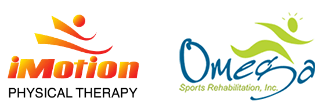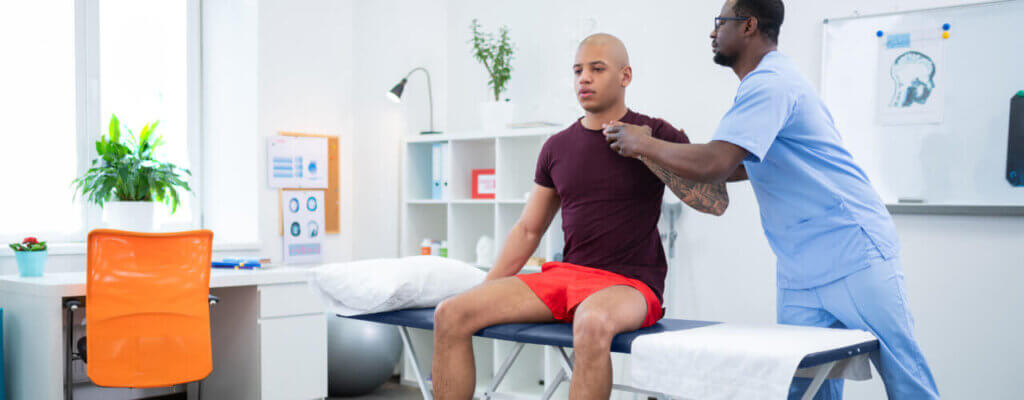Is your long-term or chronic pain holding you back? Do your constant aches and pains prevent you from living your life to the fullest? At iMotion Physical Therapy, we understand how difficult it can be to live with a chronic pain condition. Thankfully, there is a natural and drug-free way you can get started on the path to pain relief right now.
According to WebMD, “Physical therapy is often one of the best choices you can make when you have chronic pain or an injury. It can make you stronger and help you move and feel better.” The overall goal of physical therapy is to promote healing and pain relief while improving long-term mobility, function, and health.
Our physical therapists see a huge range of patients: so whether you’re looking to return to your sport, return to work, or simply wishing to reclaim your life without the worry of pain, physical therapy can help you!
Contact us today to learn more about how our physical therapists can get you started on the path toward a pain-free life!
How physical therapy tackles pain and promotes healing
Your individualized physical therapy treatment plan will depend on a variety of factors, including your type of injury, condition, medical history, and recovery goals.
Your physical therapist may prescribe you pain-relief exercises and stretches, strengthening exercises, or low-impact aerobic training. The combination of these exercises targets the pain areas in your body, eases uncomfortable symptoms, and helps your muscles loosen up and relax.
Low-impact exercises are also commonly included in patient’s therapeutic treatment plans. These movements are easy on the joints and help increase your heart rate. You might be asked to use a stationary bike, walk, or participate in aquatic therapy. You may also be given exercises to work on your core muscles or perform bodyweight exercises.
Physical therapists also frequently use other pain-relieving modalities to promote healing and increased function for the patient. Examples of PT modalities you may encounter include:
- Massage therapy. Massage therapy may also be performed, which is a gentle therapy that helps in reducing muscle spasms and allowing your body to relax.
- Ultrasound. Ultrasound therapy sends sound waves to the affected area and blocks pain messages that are sent to the brain.
- Ice and heat therapies. Ice and heat packs may be applied to the affected area to reduce pain and inflammation.
- Direct manipulation. Direct manipulation of the joints can be done to improve functioning and maintain proper alignment.
- Soft tissue mobilization. Soft-tissue mobilization is also common, which is used to increase mobility by addressing fibrous areas of muscle tissue.
- Electric stimulation. Electric stimulation therapy sends an electric current to the affected area, in order to reduce pain.
Your physical therapist may also teach you about sensory re-education for chronic pain. Even after an injury has healed, the nervous system can still send pain signals to pain receptors in the body. Sensory re-education helps desensitize the nervous system and decreases painful sensitivity to the affected area.
Still not convinced? Check out these statistics proving the effectiveness of physical therapy for pain relief.
According to the American Physical Therapy Association (APTA), “Studies have shown the efficacy of physical therapy in treating and reducing pain, as well as preventing chronic pain.” Some statistics supported in these studies include:
- Success for pre-and post-surgical rehab. Preoperative exercise and education led to significant reductions in pain, shorter postoperative care, and improved function in patients undergoing total hip arthroplasty, according to a study of 35 randomized controlled studies with a total of approximately 3,000 participants.
- Success for low back pain. Exercise therapy for individuals with low back pain can reduce pain, enhance function, and help people return to work, according to a study of more than 60 randomized controlled trials. The American College of Physicians also states that “non-pharmacologic interventions are considered first-line options in patients with chronic low back pain because fewer harms are associated with these types of therapies than with pharmacologic options.”
- Success for arthritis. Studies have shown that therapeutic exercise programs can reduce pain and improve physical function among individuals with hip and knee osteoarthritis.
Ready to start your road to recovery? Contact iMotion Physical Therapy today!
Physical therapy is a non-invasive, safe, and holistic approach to pain management. With physical therapy’s conservative approach, you can avoid surgery and the reliance on dangerous, habiting-forming prescription drugs.
Your physical therapist will complete a comprehensive evaluation to determine the root cause of your pain and develop an individualized treatment plan based on your specific needs.
You don’t have to suffer from pain any longer. Contact our office today to discover how our team of dedicated and passionate staff can help get you started on the path toward long-lasting relief.
Sources:
- https://www.moveforwardpt.com/benefits/default.aspx
- https://www.moveforwardpt.com/Resources/Detail/7-myths-about-physical-therapy
Tags: Physical Therapy, physical therapist, Natural Pain Relief, physical therapy clinic


